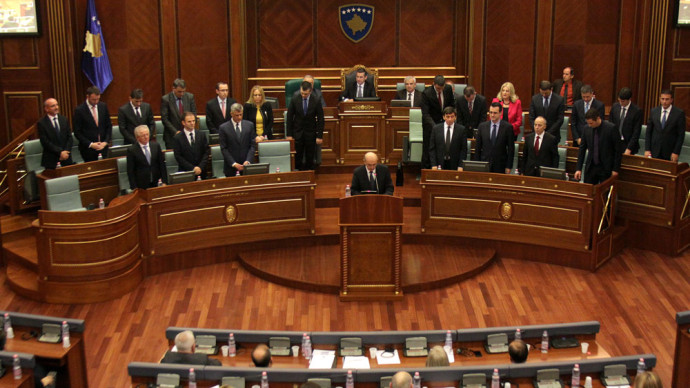By Shqipe Mjekiqi (Trinity College Dublin)
A new coalition government was approved in Kosovo on 9 December, following a six-month period of unsuccessful attempts to put a government together. The Democratic Party of Kosovo (PDK), which came out of the elections as the plurality winner, found itself in difficult circumstances after the New Kosovo Alliance (AKR), its former coalition partner, failed to pass the 5% threshold and lost all its parliamentary seats. Although AKR was critical of its joint government with PDK, the latter would have hoped to receive AKR’s support, along with minority communities, to form a new government together.
Main opposition parties (LDK-AAK-Nisma), committed to prevent a ‘Thaci III’ government, instead chose to form a joint parliamentary group themselves with the support of Vetevendosje (VV) movement. Despite programmatic differences between the three, the AAK leader, Ramush Haradinaj, was very much in favor of the initiative considering his political ambitions to become Prime Minister again (he served as PM during the LDK-led coalition in 2004). Nisma was also strongly in support of the initiative considering that it emerged out of internal factions within PDK. On the other hand, LDK proclaimed it did not want to govern with PDK again, having governed together during the 2007-10 term.
By forming a joint parliamentary group, the opposition parties hoped this would enable them to elect the speaker and consequently form the government together, since under the constitution the largest parliamentary party group is called by the President to try and do so. In fact, at the constitutive session of 17 July, the opposition ‘Block’ managed to get Isa Mustafa, LDK’s leader, elected as speaker but this was short-lived as upon the request of PDK the Constitutional Court reinstated PDK’s right to do that and invited Members of Parliament to work together in reaching a solution. Yet, as it was shown in a subsequent parliamentary session, lacking opposition’s support, PDK was not able to have its own candidate approved by the parliament.
Despite a prominent role by the Constitutional Court in interpreting what were considered ambiguous provisions in the constitution, the President of the country Atifete Jahjaga, apart from asking the court to clarify the provisions herself, also stepped in by holding several discussions with leaders of major political parties in Kosovo in her attempts to bring about an agreement. Considering that the opposition block held mainly because of leaders’ political ambitions in dividing the spoils of office rather than shared programmatic values, the group fell apart when PDK was willing to let Isa Mustafa become the Prime Minister if the two governed together. As a result, a new PDK-LDK government joined by Srpska Lista, the major Serbian group, was formed on 9th December that included 21 Ministers and over 50 junior Ministers (a list of ministers and their affiliation is provided below). Hashim Thaci of PDK became one of the three deputy Prime Ministers and chief diplomat. The ‘Block’ in itself dissolved as a result.
As hinted earlier, this is not the first time that PDK and LDK have government together. In 2007 November elections, just prior to the country’s declaration of independence, PDK and LDK had entered into a coalition government that lasted up until October 2010. In fact, it was LDK that broke the coalition agreement with PDK, following Fatmir Sejdiu’s (then President of the country and leader of LDK) resignation after the Constitutional Court ruled that he had violated the Constitution by being both President of the country and leader of the party at the same time. Since then, LDK has been very pronounced in its public statements to affirm its position that it did not want to govern with PDK yet another time.
Apart from the circumstances under which the government was formed, it is difficult to ascertain how politically stable this government will be especially taking into account that one of the main issue the new government will have to cope with is the establishment of a special court that will address allegations against certain members of the former KLA (Kosovo Liberation Army), from which the PDK had emerged, in the aftermath of the 1999 war. The new government will also have to resume talks with Serbia at both political and technical level that are required to accelerate both countries’ accession into the EU.
Photo source: http://www.telegrafi.com/lajme/kuvendi-voton-qeverine-e-re-ja-emrat-e-kabinetit-mustafa-2-54920.html


